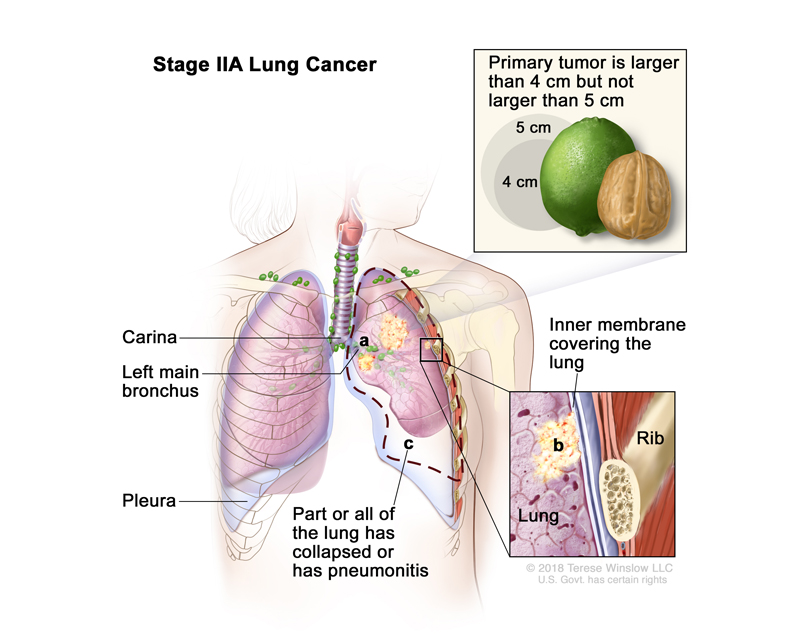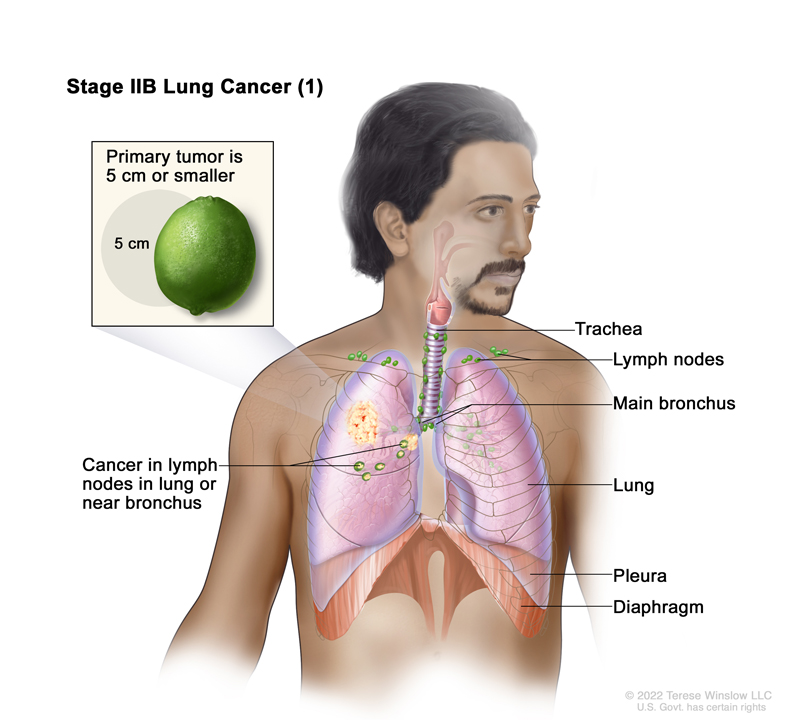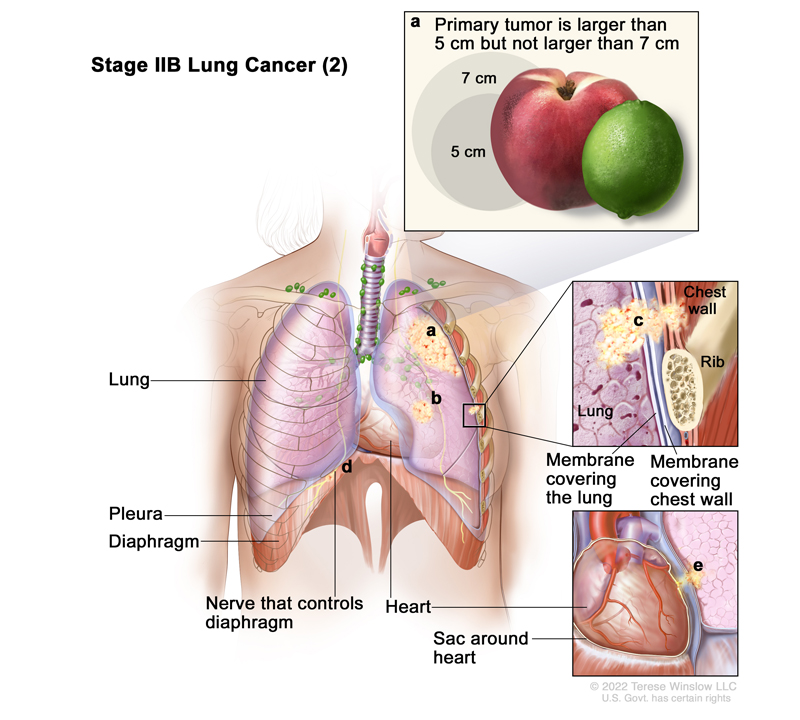- Stage 2A Lung Cancer
- Stage 2B Lung Cancer
- Understanding EGFR & PD-L1
Overview
Stage 2A Non-Small Cell Lung Cancer means that the tumor is located in one lung only and has not spread to your lymph nodes or any other part of your body.
Stage 2A NSCLC diagnosis is when:
1. The tumor is larger than 4 centimeters but less than 5 centimeters, about the size of a lime, and one or more of the following has occurred:
- The lung cancer has spread to the inner lining of your lung (visceral pleura).
- The lung cancer has spread into your airway called the bronchus but not where the main airway branches, an area called the carina.
- One of your lungs has collapsed or has obstructive inflammation.
What Tests Will I Need and Why?
Blood and Imaging tests are done to understand your general health, confirm your diagnosis and determine your cancer stage.
Tissue analysis is also typically done to determine if the cancer cells have any specific biomarkers which are critical to finding the best treatment option for you.
In Stage 2 NSCLC, doctors look for an EGFR Mutation and an elevated PD-L1 level.
If your treatment team has not already performed tests to determine your cancer’s features, please ask your doctor when these tests will be performed.
Re-read this summary as needed and then tap, “Compare My Treatment Options Now“. Our unique Comparison Page will help you understand your FDA-approved treatment options including, who can help you pay for your treatment, where and how each is given and what side-effects you may experience.

National Institute of Health/ treatment-lung
Stage 2B (1)
Stage 2B (1) Non-Small Cell Lung Cancer diagnosis is when the tumor is 5 centimeters or smaller, located in one lung only, but has spread to your lymph nodes on the same side as the primary lung cancer but not to any other part of the body.
What Tests Will I Need and Why?
Blood and Imaging tests are done to understand your general health, confirm your diagnosis and determine your cancer stage.
Tissue analysis is also typically done to determine if the cancer cells have any specific biomarkers which are critical to finding the best treatment option for you.
In Stage 2 NSCLC, doctors look for an EGFR Mutation and an elevated PD-L1 level.
If your treatment team has not already performed tests to determine your cancer’s features, please ask your doctor when these tests will be performed.
Re-read this summary as needed and then tap, “Compare My Treatment Options Now“. Our unique Comparison Page will help you understand your FDA-approved treatment options including, who can help you pay for your treatment, where and how each is given and what side-effects you may experience.

Stage 2B (2)
Stage 2B (2) Non-Small Cell Lung Cancer diagnosis is when the tumor is located in one lung only and has not spread to the lymph nodes or any other part of the body.
It also means that:
1. The tumor is more than 5 centimeters but less than 7 centimeters.
Or
2. One or more of the following:
- You have more than one tumor on the same segment (lobule) of the lung as the primary tumor.
- The tumor is affecting the chest wall.
- The tumor is affecting a nerve in the diaphragm, called Phrenic Nerve.
- The tumor is affecting the lining of your chest wall (parietal pleura).
- The tumor is affecting the lining that surrounds the heart (pericardium).
What Tests Will I Need and Why?
Blood and Imaging tests are done to understand your general health, confirm your diagnosis and determine your cancer stage.
Tissue analysis is also typically done to determine if the cancer cells have any specific biomarkers which are critical to finding the best treatment option for you.
In Stage 2 NSCLC, doctors look for an EGFR Mutation and an elevated PD-L1 level.
If your treatment team has not already performed tests to determine your cancer’s features, please ask your doctor when these tests will be performed.
Re-read this summary as needed and then tap, “Compare My Treatment Options Now“. Our unique Comparison Page will help you understand your FDA-approved treatment options including, who can help you pay for your treatment, where and how each is given and what side-effects you may experience.

National Institute of Health/ treatment-lung
Identifying Biomarkers is critical to determining the best treatment option for you
In addition to the size and cancer stage, your lung cancer treatment options will be guided by biomarkers. Biomarkers are found in your body’s tissues or fluids. For people with Stages 1-3 NSCLC, EGFR and PD-L1 are the most common biomarkers.
EGFR-positive
EGFR (Epidermal Growth Factor Receptor) is a protein that helps your body with healthy cell growth. A mutation or abnormal change in your body’s EGFR gene can cause excessive cell growth and cancer.
There are different types of EGFR mutations that doctors look for including EGFR 19 deletion, EGFR L858R and EGFR exon 20 insertion. About 10-15% of patients with Lung Cancer have an EGFR mutation. EGFR L858R is the most common type.
If you test positive for EGFR, your treatment typically includes a medication to block EGFR, called TKI or a Tyrosine Kinase Inhibitor.
PD-L1
PD-L1 is a protein that is found in healthy cells and acts as a “brake” to keep your immune system from attacking your body’s non-harmful cells. Some cancer cells “trick” the immune system to not turn on and therefore avoid being attacked.
If your tests show cancer cells with a high level of PD-L1 ( > than 50% of the cells have PD-L1), you may benefit from immunotherapy, a treatment type that takes the “brakes” off your immune system so it will recognize and attack the cancer.
Immunotherapy is only helpful when patients do not have any other mutation such as EGFR or ALK. These patients benefit from Targeted Therapy.
Recommended Lung Cancer Videos

Understanding the Stages of Lung Cancer
Stages 1 thru Stage 4

What Is Non Small Cell Lung Cancer?
Understand Your Cancer Type

ASK! Will Mutation Testing Help Find The Best Treatment For Me?
Knowing May Show What Drugs Will Work & What Won't!

Diagnosing Your Cancer
How Does a PET Scan Work?

Attitude Really Matters
Get Inspired by Ann
Commonly Searched Questions
Stage 2 Non-Small Cell Lung Cancer Symptoms
- Breathlessness or Difficulty in Breathing
- Cough for a long time
- Feeling weak
- Coughing up blood
Source: Cancer.org
Stage 2 Non-Small Cell Lung Cancer Treatment
- Surgery to remove your lung cancer. This involves removing part of the lung or a whole lobe of the lung that is affected.
- Chemotherapy may be done before or after surgery. It can also be done as an alternative to surgery when it is not possible Radiation therapy may be done after surgery or as an alternative to surgery when it is not possible.
Source: Cancer.org
Stage 2 Non-Small Cell Lung Cancer Survival Rate
Source: Cancer.gov
Stage 2 Non-Small Cell Lung Cancer Recurrence Rate
Source: PubMed.gov
Stage 2 Non-Small Cell Lung Cancer Definition
Source: Cancer.org
Stage 2 Non-Small Cell Lung Cancer Prevention
- Avoid Smoking: The most effective way to prevent lung cancer is to not smoke. If you currently smoke, quitting as soon as possible significantly lowers your risk.
- Avoid Secondhand Smoke: Minimize exposure to secondhand smoke, which can increase lung cancer risk.
- Reduce Exposure to Carcinogens: Limit exposure to known carcinogens such as asbestos and radon. Ensure proper ventilation and use protective equipment if you work with hazardous substances.
- Healthy Diet: Maintain a diet rich in fruits and vegetables to support overall lung health.
- Regular Exercise: Engage in regular physical activity to promote overall health.
- Screening for High-Risk Individuals: For individuals at high risk, such as long-term smokers, regular low-dose CT screenings can help detect lung cancer early.
Source: Cancer.org














